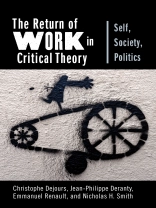From John Maynard Keynes’s prediction of a fifteen-hour workweek to present-day speculation about automation, we have not stopped forecasting the end of work. Critical theory and political philosophy have turned their attention away from the workplace to focus on other realms of domination and emancipation. But far from coming to an end, work continues to occupy a central place in our lives. This is not only because of the amount of time people spend on the job. Many of our deepest hopes and fears are bound up in our labor—what jobs we perform, how we relate to others, how we might flourish.
The Return of Work in Critical Theory presents a bold new account of the human significance of work and the human costs of contemporary forms of work organization. A collaboration among experts in philosophy, social theory, and clinical psychology, it brings together empirical research with incisive analysis of the political stakes of contemporary work. The Return of Work in Critical Theory begins by looking in detail at the ways in which work today fails to meet our expectations. It then sketches a phenomenological description of work and examines the normative premises that underlie the experience of work. Finally, it puts forward a novel conception of work that can renew critical theory’s engagement with work and point toward possibilities for transformation. Inspired by Max Horkheimer’s vision of critical theory as empirically informed reflection on the sources of social suffering with emancipatory intent, The Return of Work in Critical Theory is a lucid diagnosis of the malaise and pathologies of contemporary work that proposes powerful remedies.
สารบัญ
Contents
Preface and Acknowledgments
Introduction
Part I: Worries About Work
1. Unemployment and Precarious Work
2. Work-Life Imbalance, Disrespect at Work, and Meaningless Work
Part II: The Subject at Work
3. The Technical Dimension
4. Dynamics of Recognition
Part III: A Critical Conception of Work
5. Justice and Autonomy as Norms of Work
6. Two Models of Critique
Part IV: Performance Evaluation
7. Managerialism Versus Cooperative Management
8. From Theory to Practice: Intervention in an Enterprise
Conclusion
Notes
Index
เกี่ยวกับผู้แต่ง
Christophe Dejours is professor of psychoanalysis, health, and work at the Conservatoire National des Arts et Métiers. His many books include Souffrance en France. La banalisation de l’injustice sociale, 7th ed. (2007) and Travail Vivant, 2 vols. (2009).Jean-Philippe Deranty is associate professor of philosophy at Macquarie University. He is the author of Beyond Communication: A Critical Study of Axel Honneth’s Social Philosophy (2009) and the editor of several collections on critical theory and work.Emmanuel Renault is professor of philosophy at University of Paris-Nanterre. He has published several books on the tradition of critical theory, including Social Suffering: Sociology, Psychology, Politics (2017).Nicholas H. Smith is professor of philosophy at Macquarie University. He is the author of Strong Hermeneutics (1997) and Charles Taylor (2002) and has edited several collections on the philosophy of work.












